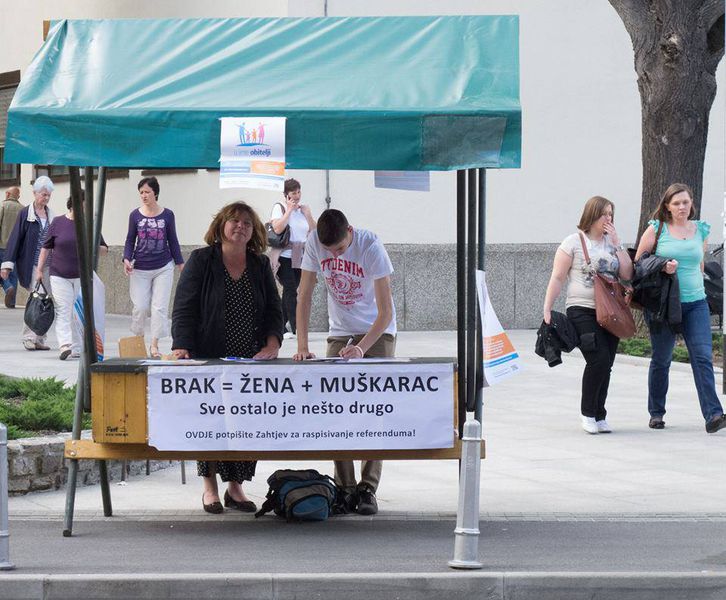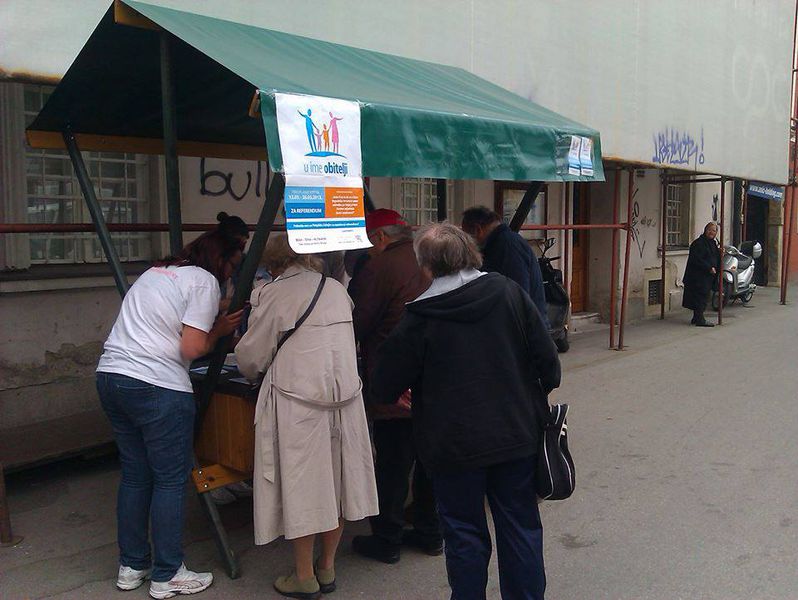Croatian Catholic Church - Best Organised Institution in Croatia
Elitsa Mateva, May 27, 2013
 Against the backdrop of global achievements in terms of legislation that is more receptive of same sex marriages, the Catholic Church in Croatia has organised its own campaign under the name “U ime obitelji”/”In the name of family”, starting weeks before the local elections [May 19]. The initiative is focused on collecting signatures for a referendum aiming to make the institutional bondage between a man and a woman the only legal form of marriage by incorporating it into the Constitution. This is just one of a series of public actions which the Catholic community has engaged with in the last months – the total of these suggesting a thought-through strategic effort to maintain its political and social influence.
Against the backdrop of global achievements in terms of legislation that is more receptive of same sex marriages, the Catholic Church in Croatia has organised its own campaign under the name “U ime obitelji”/”In the name of family”, starting weeks before the local elections [May 19]. The initiative is focused on collecting signatures for a referendum aiming to make the institutional bondage between a man and a woman the only legal form of marriage by incorporating it into the Constitution. This is just one of a series of public actions which the Catholic community has engaged with in the last months – the total of these suggesting a thought-through strategic effort to maintain its political and social influence.
Besides outrage and expressions of despair among a part of the population, the campaign is proving quite successful. There are stands where one can sign for a referendum all around Zagreb and other cities, and many active volunteers are driving the initiative forward. Some even tried collecting signatures at election stations (forbidden by law) until they were reported and asked to leave. The campaign is active online, too, through a Facebook group (more than 17.000 likes so far), which quickly found an opponent – “U ime svake obitelji”/ “In the name of any family”, a group created by two heterosexual women (more than 20.000 likes). A major share of the campaign’s supporters are above the age of the most Facebook-active part of the population, while the supporters of the counter-campaign are mostly Facebook-active, which means that the visible ‘likes’ reflect perhaps only a fraction of the public opinion. Even though on a small scale for now, more counter-actions are being organised as many feel that human rights are under threat.
The Croatian Catholic Church has once more demonstrated its ability to mobilise members of the community and lead a successful campaign, which other organisations and political parties are struggling with. The Church has also made use of its prestige to excuse more daring actions and language, and through that has earned itself the reputation of a fascist organisation. The choice of collecting signatures for a referendum itself is quite interesting bearing in mind that Croatia has had only two referendums so far – one for Croatia’s independence, and one for its membership to the EU. Organising a referendum is costly and complicated, and particularly inappropriate when it comes to voting on the rights of minority groups.
The Croatian Catholic Church has historically played a crucial role in Croatian society and politics. Now, on the way to the European Union, with evolving mindset shifting towards a more secular society and a hesitant, but inevitable drift away from the post-war political set-up, the Church has to adjust in a manner similar to the global re-adaptation of religious institutions. However, in Croatia, the legacy of the past still holds strong, providing the Church with immunity not only in terms of political statements, but also in terms of public opinion. Besides disapproval of more recent public statements and actions of the Catholic community, criticism towards the institution remains mostly private, rather careful, or limited to relatively small groups of activists, journalists and bloggers.
The Catholic Church in Croatia has been a major proponent of the argument that Croatia should not be classified as belonging to the Western Balkan group – a part of South-East Europe – but to the Central European group. Croatia is the only country with a Catholic religious majority [Slovenia is rather secular in this respect, though with Catholic background, too] in the region, which according to the local religious institution makes it a part of the Western European cultural circle. The claim has formed a prominent frame of identification reflected in Croatian politics and society, the religious argument being among the most important, which demonstrates the central role of the Church in identity formation. The Catholic institution has interpreted the approaching accession of Croatia to the EU as a victory of its own. It also appears to have given a push to its ambition to contain an influential role, visible within a  series of organised initiatives and public statements, the latest being the campaign “In the name of family”.
series of organised initiatives and public statements, the latest being the campaign “In the name of family”.
At the end of last year and the beginning of this year, a number of events demonstrated that the Croatian Church is seeking publicity that would accentuate its political and social leverage. It has initiated a series of attacks, which can be seen as attempts to sabotage the current ruling party SDP against the backdrop of approaching elections. One of the areas where the church raised a critical voice is the newly introduced sex education programme in schools.
According to the catholic religious authority, this addition to the school curriculum has a negative effect, stimulating homosexuality, rape, and other forms of sexual abuse and general physical aggression. Above all, the Church argued that no one, but the parents, should be allowed to tell children about those things. In support of the campaign, HDZ (a conservative opposition party, which was in government for a long time) invited controversial speaker Judith Reisman to speak at the Faculty of Philosophy at the Zagreb University. Reisman's hard-line talk, during which she blamed homosexuality for Nazism, provoked outrage among journalists, students, and professors. The attempted strengthening of the argument against sexual education through the association with Reisman played a trick on the party and the religious community in terms of public opinion.
Another subject of dispute in the last months was the exhibition of an announcement poster for a theatre play at the Gavella theatre in Zagreb, displayed last January. The poster depicted two female statues in an embrace, both resembling the Virgin Mary. Considering that the play was about a lesbian couple, the poster image was interpreted by the religious community as an offence. The Catholic association Vegilare organised an intensive campaign against the poster through their online pages exerting great pressure on the theatre director. The mayor of Zagreb, Milan Bandic (a former member of SDP, who is suspected of close links to HDZ), ordered the poster to be removed from all public spaces. The event resulted in an invigorated dispute, in which designers, artists, and other individuals organised a campaign in support of the poster and freedom of expression.
In the last months, the Croatian Catholic Church has loudly exercised the role of a critical and particularly aggressive ‘regulator’ of social and political life. Some analysts speculate that this is the effect of a declining interest in the institution, the result of fatigue with its conservative approaches. Given the evident attacks towards the governing party SDP, the verbal aggression and “militant approach” of the Catholic Church have been interpreted as part of a desperate attempt to regain political leverage and help its traditional political partner - the HDZ party - to get back on track.
The recent events have given visibility to social and political divisions and exemplified the alliance between the Church and the right wing against the current leadership of SDP. The collaboration  appears appropriate, given their historic bondage, the existence of a common adversary and what until recently seemed true – a shared issue of declining popularity.
appears appropriate, given their historic bondage, the existence of a common adversary and what until recently seemed true – a shared issue of declining popularity.
The most recent events have motivated a more critical view of the Catholic institution in Croatia. However, the ‘decline of popularity’ of the Church remains disputable. Leaving aside the growing occasions of disagreement with the approach of the Catholic community, respect for the Church is deeply rooted in Croatian society, and its political involvement will not seize easily. Historical facts about the Church’s dominant role in preserving Croatian culture and identity leave many Croatian people with controversial feelings from the recent scandals. To a great extend even non-religious individuals experience a sort of reverence towards the Catholic authority and public criticism of it is not popular.
Concerning HDZ’s popularity, the results from the local elections demonstrate that they still have a strong support base that will be difficult to weaken (coming second after SDP with a small difference). The alliance between the HDZ and the Catholic authority provides a powerful political leverage in the face of rising alternatives. The popularity of both is mostly based on past achievements, although nostalgic shifts driven by likely disappointment with new governments are possible. Perhaps the gap between supporters and opponents of the socio-political involvement of the Church are becoming more visible and might press the Catholic community to ease its tone and take a more contained position with less involvement. The most recent events demonstrate that this process will be lengthy and the prospect unlikely in the near future. We are still to see if Croatia’s entry to the European Union will have an impact on the matter.
 Kolinda Grabar-Kitarovic | © KGK
Kolinda Grabar-Kitarovic | © KGK Jozo Rados | © European Parliament
Jozo Rados | © European Parliament Aleksandar Vucic, Andrej Plenkovic | © Vlada RH
Aleksandar Vucic, Andrej Plenkovic | © Vlada RH